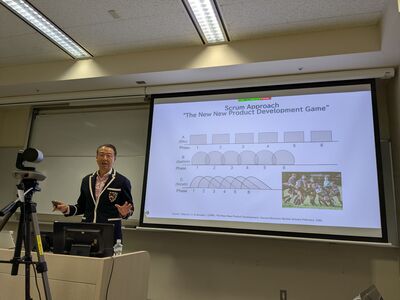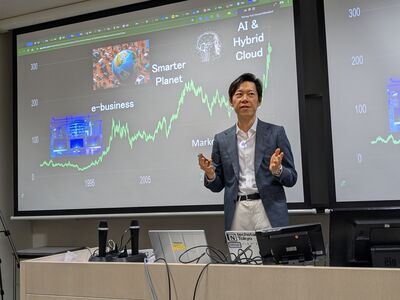Dean's Guest Speaker Series 2025 | Spotlighting the Impact of Knowledge Creation Theory in Practice
In 2024-25, Hitotsubashi ICS Dean and Professor Emi Osono is dedicating her flagship series to a reaffirmation of the strength, influence and impact of our school's foundational intellectual contribution, knowledge creation, pioneered in the 1980s by our founders Profs. Ikujiro Nonaka and Hirotaka Takeuchi.
Throughout this academic year, we are hearing from authoritative voices, from Japan and around the world, and from academe and business, on the impact of knowledge creation tenets on teaching, research, and business practice.
It All Started at Hitotsubashi ICS
Professor Hirotaka Takeuchi was the star of the first event in the series. All attending were treated to a short history of both knowledge creation theory and our school, infused with colorful anecdotes and images from the 25-year life of ICS. We express enthusiastic thanks to Professor Takeuchi for his many contributions to our success and for kicking off this special year in authentic ICS style.
Takeuchi reminded us of the distinction between explicit and tacit knowledge, emphasizing the wide applicability of the SECI model--Socialization, Externalization, Combination, and Internalization--developed in collaboration and the impact of their book The Knowledge-Creating Company (1991). Tracing the origins of the book's concepts back to their earlier work on new product development processes and the rugby scrum metaphor, he explained the role of these influences in the development of agile methodologies.
Takeuchi emphasized the enduring significance of knowledge creation theory, pointing out that their theory originated from studying Japanese companies, but gained international recognition through its publication in English. Knowledge creation theory has had global impact, via its inclusion in MBA curricula at prestigious business schools and its application in Japanese companies in real-world business challenges, including the rise of AI which calls for increasingly sophisticated integration of machine learning with human insights. This was the topic of the second talk in the Dean's Guest Speaker series.
Knowledge Creation and AI
As organizations grapple with rapid technological advancement, Professor Patrick Reinmoeller of IMD spoke to the ICS community on the relationship between knowledge creation and artificial intelligence.
In a refreshed take on wise leadership, Reinmoeller offered practical observations and advice for using and applying AI. He addressed the balancing of technical prowess with human wisdom, understanding the distinction between AI's probabilistic nature versus true sentience, and the critical role of purpose in successful AI implementation. Prof. Reinmoeller emphasized that while AI presents powerful capabilities in text generation and creative tasks, the human element remains crucial in steering these tools toward meaningful outcomes.
The session highlighted that effective AI utilization requires more than just technical knowledge - it demands a deep understanding of humanities and domain expertise. As we navigate this transformative era, our focus should be on leveraging AI as a tool for enhancement rather than replacement, always keeping human values and wisdom at the forefront of technological advancement. Success in the AI age means effectively combining technological capabilities with human insight and purpose.
Welcome to the AI Department
March 25 brought us a talk by Naoki Kadowaki, Partner, Impact Innovations Leader, IBM Consulting, who introduced the concept of the "AI Department," an organization-wide integration of AI to enhance collaboration and transcend traditional silos.
Kadowaki explored how AI is reshaping work, communication, and creative collaboration. Introducing the concept of multi-agent systems, he highlighted the importance of diverse human-machine interactions in organizational innovation. He also reflected on the cultural challenges of applying AI within traditional Japanese corporations - emphasizing that technology adoption is as much about mindset and values as it is about infrastructure. There is a need for a more creative, open approach to AI: one that values experimentation, knowledge diversity, and continuous learning; Innovation must be both technological and rooted socially, in dialogue and adaptability.
Knowledge creation theory's emphasis on context, meaning, and cultural nuance reinforces our framing of AI as a partner rather than a substitute, and keeps us focused on the human side of human-machine collaboration.










